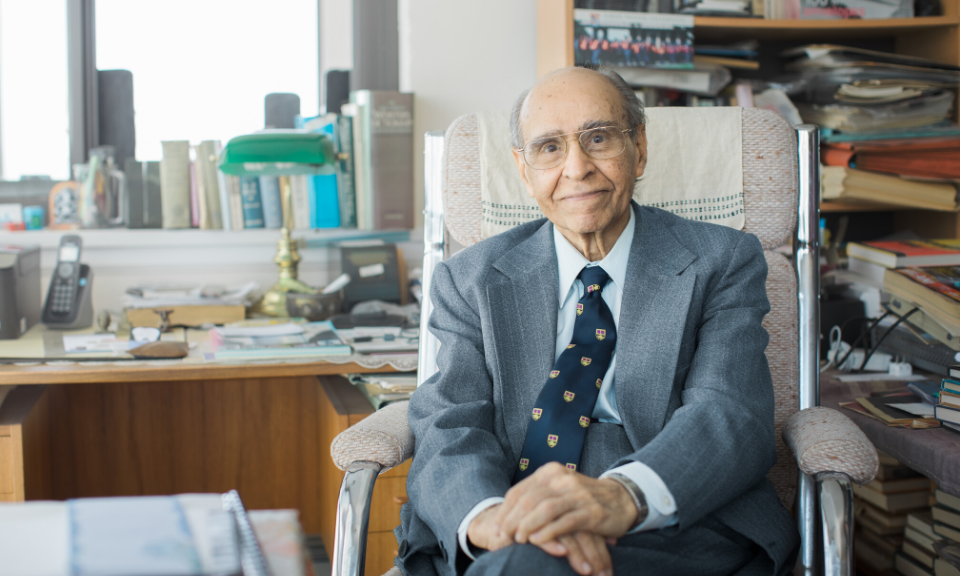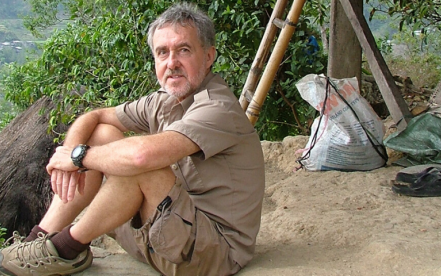At home in three continents

They say you can’t go home again. But in many ways, SFU professor emeritus A. H. “Som” Somjee never really left.
Born in India in 1925 and educated there as well as in Europe, Som eventually settled in North America and has retained his contacts and interests in all three regions over many decades. Joining SFU for its opening in 1965, he returned to India numerous times for field research and continues to be fascinated by its people, economic development and democratic process.
“India is an extraordinarily complex country,” Som says. “It’s home to one of the oldest civilizations and has seen all kinds of leaders come along. It’s the world’s largest democracy with almost 1.3 billion people. Will it stay that way? More people are getting interested in Indian democracy and what the future holds.”
India was still under British rule during Som’s early life and became independent while he was a young teacher in the state of Udaipur. After completing his PhD in western political philosophy at the London School of Economics, he secured a teaching position at Maharaja Sayajirao (MS) University of Baroda that would last nine years.
Som found himself questioning how India’s democratic system would survive and began to dig more deeply into religion, caste, class and other intricacies that impact Indian political life and society. His early publications focused on voting behavior, democracy and political change in Indian villages; later he would explore the democratic process and political capacity in developing societies as well as development theory.
“During 40 years of my field research, India and other countries in Asia went through a period of significant change. I was able to watch it and write about it. It is something to be taken seriously.”
To support further knowledge and understanding of his homeland, Som has generously left a gift to SFU in his will to help create the Dr. A.H. Somjee and Dr. Geeta Somjee Professorship in Indian Political Development. Part of his $3 million commitment to the university, this exceptional contribution honours his legacy as a beloved political science professor, well-published author, prolific researcher and philanthropic leader.
Som previously established two endowment funds at SFU in memory of his wife and lifelong research collaborator Geeta, who passed in 2013 after 56 years of marriage. The funds support three graduate fellowships and five undergraduate scholarships in political science.
“To be able to give is such a pleasure! I had heard about it, but did not believe it. But now I do,” Som writes in the closing line of his autobiography, In Three Continents.
In person, he is exceptionally humble about his and Geeta’s philanthropy. He explains that they lived frugally, saved carefully and invested well in order to give back to SFU, Lions Gate Hospital Foundation and universities in India with which they were affiliated.
Som is happier to discuss their fruitful careers, experiences and perspectives as scholars from developing countries who flourished in the West.
He fondly recalls “blazing a trail” to establish the political science department (which began as a unit with sociology and anthropology), exchanging ideas with colleagues in SFU’s “very tumultuous” early years, seminars over dinner, conducting research with Geeta in various Indian and South Asian communities, holding visiting professorships at Harvard three times, and writing books in southern France where the Somjees owned an apartment for nearly 40 years.
“We could look out over the ocean, and there was also good food and wine,” he smiles.
He considers himself blessed with the opportunity to be in more than one country, to have built strong connections in each, and to have experienced so many interesting times over his almost 95 years.
“We enjoyed our life,” Som says. “I’m very grateful.”

